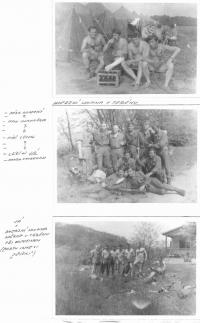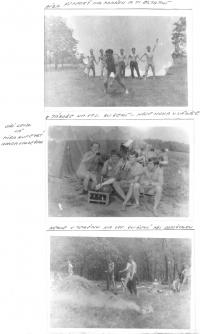“We could sense that this would be no ordinary war.”

Download image
František Gult was born on the 7th of April, 1947 in the village of Střížovice in the Kroměříž District. He was the only child of a tanner and a seamstress. After completing primary school, he began an apprenticeship in general metalworking at the Pal Magneton works in Kroměříž. He finished his third year in Dioptra Kroměříž. Before starting compulsory military service, he was active in Svazarm (a military/technical enthusiasts association - transl.) as a parachutist, and it was this experience that made the drafting committee recommend him to the elite paratroopers’ group, the 7th Paratrooper Regiment in Holešov. The regiment was under the command of Lieutenant Colonel Vladimír Košan, consisted of about five hundred soldiers, and took orders directly from the Intelligence Administration of the General Staff. After two months of boot camp, he underwent rough and strenuous training. As an intelligence-diversion unit, they both trained parachute drops mostly from AN-2 planes (“COLT” in NATO code) and specialised in surveying behind enemy lines. They used modern weapon models (Czech submachine gun model 61), RAS radio stations (R-350, R-352), and they were the first in Czechoslovakia to undergo training for plastic explosives (P1-NP-10) and for disarming Pershing nuclear warhead missile carriers (MGM-1 Pershing). Paratrooper training included lessons in topography, coding, and tactics. The soldiers were required to have a good knowledge of foreign languages, healthcare, and chemistry among others. Using Western military methods, they completed training missions. They also took part in training sessions with soldiers of the Russian army, which, as they found out in August 1968, was not coincidental, as they wanted to gauge the combat readiness of the 7th Paratrooper Regiment. On the day the Warsaw Pact armies invaded Czechoslovakia, the 21st of August 1968, some eighty soldiers including František were transported out of their barracks in civilian attire. Under the difficult circumstances, they monitored a Russian battalion consisting of light tanks and about twenty military vehicles and at the same time, they served as the barracks first line of defense. They constructed hide-outs for people wanted by the Soviet secret service and a base for partisan resistance. There were speculations about the possibility of freeing the Czechoslovak Prime Minister, Alexander Dubček, and other state representatives who were being held in the Soviet Union, but this was unfeasible. After three days, the Russian unit withdrew. František Gult and the other members of the “sharp company” returned to the barracks. Several members of the unit were subsequently transferred to Gottwaldov (now Zlín) to reinforce the security of public buildings. When the situation calmed down, Gult served the rest of his two months of compulsory military service and returned to a normal life. The anti-occupation stance of the Holešov military group 7374 resulted in its dissolution in 1969. The soldiers were transferred to other groups and the commanding officers who were active in August 1968 were released from the army. State Security even included Vladimír Košan and Jiří Dufek on the list of undesirables in Operation Norbert. In autumn 1968, František Gult began work at Svit Otrokovice where he worked as a workshop metalworker and helped implement improvements. He completed an evening secondary technical school in Zlín and married. In the 1970s, he joined the Communist Party of Czechoslovakia. He was offered a position in the police force (Public Security), but he refused and remained in Svit until his pension. In the years 1978 to 1989, he was also a member of the People’s Militias. František Gult is a member of the Club of Paratrooper Veterans Holešov, and he takes part in commemorating the paratroopers and in promoting their traditions, especially those of the 7th Paratrooper Regiment Holešov.




